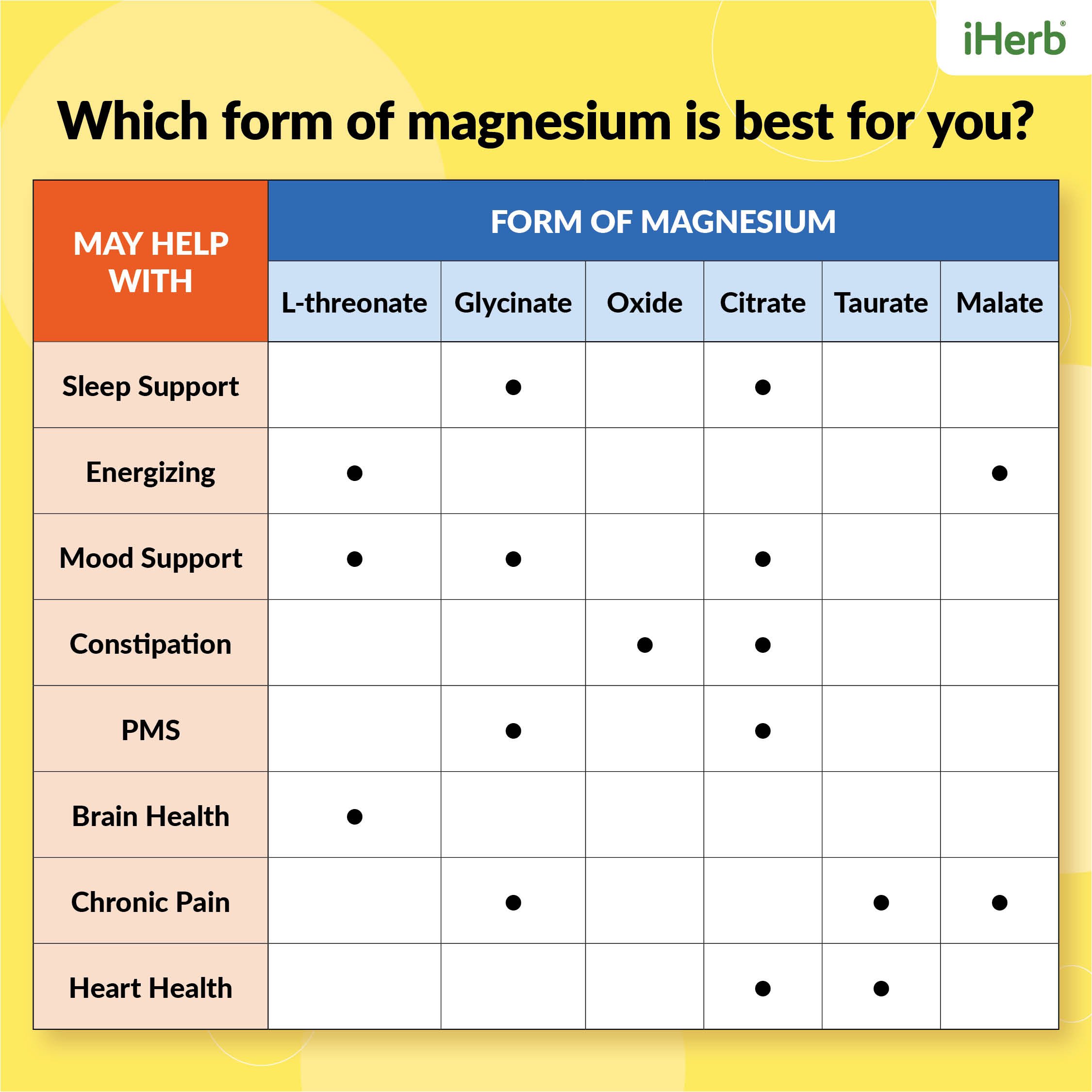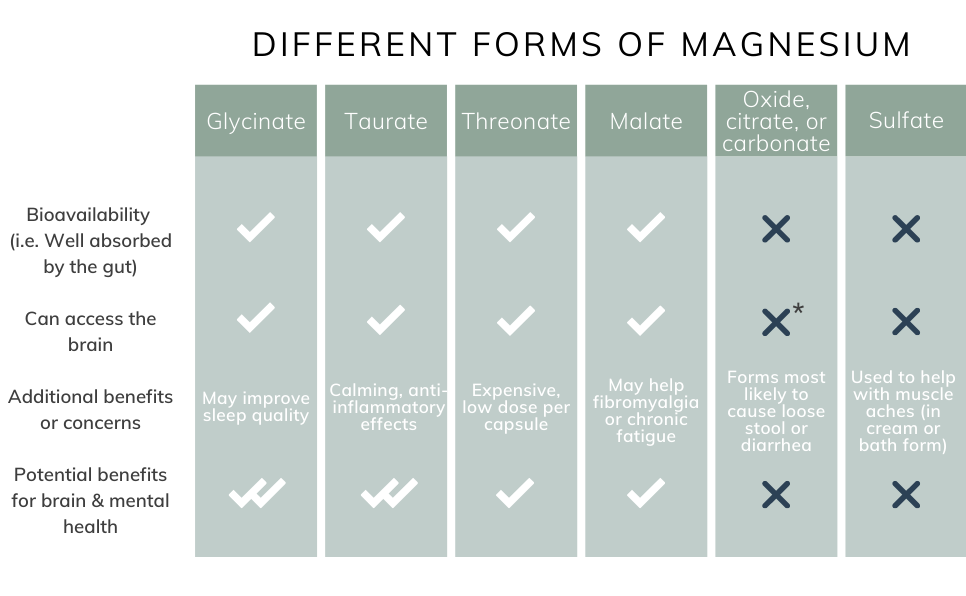Magnesium comes in several forms, each offering unique benefits. So, which type of magnesium is best?
Magnesium is vital for many body functions. It supports muscle health, nerve function, and energy production. Yet, not all magnesium supplements are the same. Some types absorb better than others. Different forms cater to specific health needs. For instance, magnesium citrate is often recommended for constipation.
On the other hand, magnesium glycinate is popular for improving sleep and reducing anxiety. Understanding these differences helps you choose the right type for your needs. This guide will explore various magnesium forms and their benefits. By the end, you will know which type suits you best.
Introduction To Magnesium
Magnesium is a crucial mineral for our bodies. It supports over 300 biochemical reactions. It helps muscles and nerves function properly. It also keeps our heart rhythm steady and bones strong.
Importance Of Magnesium
Magnesium is vital for many functions in the body. It helps with energy production. It also regulates blood pressure. Magnesium is essential for muscle and nerve function. It helps in DNA synthesis and protein production. A proper level of magnesium can improve sleep quality and mood.
Magnesium plays a key role in heart health. It helps maintain a healthy heartbeat. It also supports a healthy immune system. Magnesium even aids in maintaining normal blood sugar levels.
Common Deficiencies
Many people do not get enough magnesium. This can lead to magnesium deficiency. Symptoms include muscle cramps, fatigue, and irregular heartbeats. It can also cause mental health issues like anxiety and depression.
Aging and certain health conditions can increase the risk of deficiency. Poor diet is another common cause. Foods rich in magnesium include leafy green vegetables, nuts, and whole grains. People who do not eat these foods may need supplements.
Magnesium deficiency can have serious effects. It can lead to osteoporosis and heart disease. Early detection and treatment are important. Speak to a healthcare provider if you suspect a deficiency.

Credit: www.iherb.com
Magnesium Oxide
Magnesium oxide is often recommended for its high magnesium content. It helps with digestion and relieves heartburn. This type is also cost-effective.
Magnesium Oxide is a common form of magnesium. It's often used in supplements and medications. This type of magnesium offers several health benefits. But it also has some side effects. Let's explore both.Benefits
Magnesium Oxide helps in relieving heartburn and indigestion. It works as an antacid. It neutralizes stomach acid quickly. This form of magnesium also supports bowel movements. It acts as a laxative. It helps ease constipation. Magnesium Oxide can also aid in muscle and nerve function. It supports muscle relaxation. It may reduce muscle cramps. This form of magnesium is also good for bone health. It helps the body use calcium effectively.Side Effects
Magnesium Oxide can cause some side effects. It may lead to stomach upset. Some people experience diarrhea. This is due to its laxative effect. It can also cause nausea. Taking too much Magnesium Oxide may lead to an overdose. Symptoms can include low blood pressure, confusion, and irregular heartbeat. Always consult a doctor before starting any supplement. Using Magnesium Oxide responsibly can help you enjoy its benefits. But be aware of the possible side effects.Magnesium Citrate
Magnesium citrate is a popular form of magnesium supplement. It is known for its high absorption rate. This makes it a preferred choice for many.
Absorption Rate
Magnesium citrate has a high absorption rate. This means the body can use it more efficiently. Unlike other types, magnesium citrate dissolves well in water. This helps the body absorb it quickly. This is why many people choose it over other forms.
Uses
Magnesium citrate serves multiple purposes. It is commonly used to treat constipation. It works as a laxative. This makes it helpful for those with irregular bowel movements.
It also helps with muscle cramps. People with magnesium deficiency often experience cramps. Magnesium citrate can help relieve these symptoms.
In addition, it supports overall health. It helps with nerve function and keeps bones strong. It also supports cardiovascular health. These benefits make magnesium citrate a good choice for many.

Credit: chandramd.com
Magnesium Glycinate
Magnesium Glycinate is a popular form of magnesium supplement. It combines magnesium with glycine, an amino acid. This combination helps improve absorption and reduce stomach upset. Many people choose Magnesium Glycinate for its potential health benefits.
Pros
Magnesium Glycinate is gentle on the stomach. It is less likely to cause diarrhea compared to other forms. This makes it a good choice for those with sensitive stomachs.
It is also well-absorbed by the body. This leads to better effectiveness in addressing magnesium deficiency. Magnesium Glycinate helps support sleep and reduce anxiety. It may also aid in muscle relaxation and recovery.
Cons
One downside is the cost. Magnesium Glycinate can be more expensive than other types. This may not fit everyone's budget.
It can also be hard to find. Not all stores carry this specific form. This might make it less convenient for some users.
Magnesium Chloride
Magnesium chloride is a popular form of magnesium supplement. It is known for its high bioavailability, meaning the body can absorb it easily. This form of magnesium is often used in topical solutions and oral supplements.
Top Benefits
Magnesium chloride offers several benefits for the body. Here are some of the top advantages:
- Improves Digestion: It helps to regulate stomach acid levels, aiding in better digestion.
- Enhances Sleep Quality: Magnesium chloride can calm nerves and promote restful sleep.
- Boosts Energy Levels: It plays a crucial role in energy production at the cellular level.
- Supports Muscle Function: This form of magnesium helps in muscle relaxation and reduces cramps.
- Skin Health: Applied topically, it can improve skin hydration and reduce inflammation.
Potential Drawbacks
While magnesium chloride has many benefits, there are some potential drawbacks to consider:
- Gastrointestinal Issues: High doses can cause diarrhea and stomach upset.
- Skin Irritation: Topical use might cause irritation or a burning sensation for some individuals.
- Taste: Oral supplements may have a bitter taste, which some find unpleasant.
Understanding these pros and cons can help you decide if magnesium chloride is the right choice for your needs.
Magnesium L-threonate
Magnesium L-Threonate is a unique form of magnesium. It has gained popularity for its potential cognitive benefits. This form of magnesium is easily absorbed by the brain. It supports brain health and mental clarity.
Brain Health
Magnesium L-Threonate is known to support brain health. It crosses the blood-brain barrier more effectively. This helps improve brain function and cognitive abilities. Studies suggest it may enhance memory and learning. It can also reduce brain fog and mental fatigue.
This form of magnesium can support mental clarity. It may help with focus and attention. Many users report feeling more alert and sharp. It is often recommended for those seeking cognitive support.
Dosage Recommendations
The recommended dosage of Magnesium L-Threonate varies. Most experts suggest 1,000 to 2,000 mg per day. It is best to start with a lower dose. Gradually increase the dose based on your needs.
Always follow the dosage instructions on the product label. Consult with a healthcare professional before starting any supplement. Taking it with meals can enhance absorption. Divide the dose into two or three smaller doses daily. This helps maintain steady magnesium levels in the body.
Magnesium Malate
Magnesium Malate is a popular form of magnesium that combines magnesium with malic acid. It's known for its potential benefits in energy production and muscle function. This form of magnesium is easily absorbed by the body, making it an ideal choice for many people.
Energy Production
Magnesium Malate plays a vital role in energy production. It helps convert food into energy at a cellular level. This is essential for maintaining overall vitality. Malic acid is a key player in the Krebs cycle. This cycle is crucial for generating ATP, the body's main energy source.
Suitable For
Magnesium Malate is suitable for individuals with chronic fatigue. It's also helpful for those with fibromyalgia. People looking for an energy boost may benefit from it. This form of magnesium is gentle on the stomach. It's a good choice for those with digestive sensitivities.
Choosing The Right Magnesium
Choosing the right magnesium can be confusing with so many options available. Each type of magnesium offers unique benefits. Understanding your specific needs and considering various factors can help you make an informed decision.
Factors To Consider
When selecting magnesium, consider these important factors:
- Absorption Rate: Different forms have different absorption rates. Magnesium citrate and magnesium glycinate are highly absorbable.
- Purpose: Some types are better for specific issues. For example, magnesium oxide is good for constipation.
- Side Effects: Some forms may cause digestive issues. Magnesium citrate can lead to diarrhea in high doses.
- Availability: Ensure the form you choose is readily available. Some types may be harder to find.
Personal Needs
Your personal needs play a crucial role in choosing the right magnesium:
- Sleep Issues: Magnesium glycinate is often recommended for better sleep.
- Muscle Cramps: Magnesium chloride and magnesium sulfate are effective for muscle cramps.
- Anxiety: Magnesium taurate can help reduce anxiety levels.
- Constipation: Magnesium oxide is known for its laxative effect.
Choose a magnesium form that aligns with your health goals. Always consult with a healthcare provider before starting any supplement.
Credit: whynotnatural.com
Frequently Asked Questions
What Are The Types Of Magnesium?
There are several types of magnesium supplements. These include magnesium citrate, magnesium glycinate, magnesium oxide, and magnesium chloride. Each type has unique benefits.
Which Magnesium Is Best For Sleep?
Magnesium glycinate is often recommended for sleep. It is known to promote relaxation and improve sleep quality. It is also gentle on the stomach.
Which Magnesium Is Best For Anxiety?
Magnesium taurate and magnesium glycinate are commonly used for anxiety. They help regulate neurotransmitters that influence anxiety levels. Both are well-absorbed by the body.
Which Magnesium Is Best For Constipation?
Magnesium citrate is commonly used for constipation relief. It has a laxative effect and helps soften stools. It's effective and works relatively quickly.
Conclusion
Choosing the best magnesium type depends on your specific needs. Magnesium citrate aids digestion. Magnesium glycinate helps with sleep and relaxation. Magnesium oxide is good for heart health. Each type offers unique benefits. Consult your doctor for personalized advice. Remember, a balanced diet ensures adequate magnesium intake.
Supplements fill in the gaps. Prioritize your health and make informed choices. Your body will thank you.






